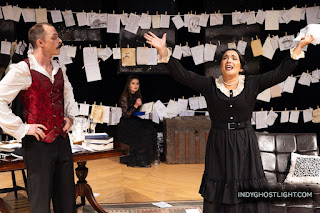The directive of 'it must be broken': 'Seeking Nietzsche' probes German philosopher
Of all the books about music I've read, Alex Ross' "Wagnerism: Art and Politics in the Shadow of Music" is the only one that got me thinking: "Sure, music is important, but it's not THAT important."
 |
| Elisabeth gives vent to her exasperation with Friedrich. |
That private response is no knock on Ross, a much-admired music critic who garnered well-deserved praise for this exhaustive 2020 study. Rather, the idolatry of Wagner and his music-drama had a kudzu-like spread well into 20th-century Western culture, and tempts one to think that no music should be assigned that kind of quasi-religious significance, absorbing and elevating a wealth of regrettable biases into the bargain. Ross' attention to this phenomenon is itself wholly admirable.
Among the most famous early acolytes of the Wagnerian message was Friedrich Nietzsche, the subject of Marcia Eppich-Harris' new play, "Seeking Nietzsche," which opened Thursday night in Shelton Auditorium. The Southbank Theatre Company production, directed by Evren Wilder Elliott, examines the Wagner-Nietzsche relationship, mainly how it illuminates the transition of the idiosyncratic German philosopher from advocacy to hostility as the grip of illness dragged the articulator of the Übermensch (Superman) into madness.
The action goes beyond the lives of both men into the destructive rise of Nazi Germany and the institutionalization of the composer's antisemitism, which Nietzsche opposed. Admirably, Eppich-Harris doesn't attempt to come to definitive conclusions about either flawed genius. What might seem universally laudable about Nietzsche is undercut by an absolutism that matches Wagner's mistaken mission to demonstrate German cultural superiority through imperishable art.
Nietzsche's Wagnerian phase occurred in the midst of his frantic productivity as a writer, ranging from intricately argued works with literary overlay to a penchant for aphorisms more pronounced than any other major thinker since Blaise Pascal. The set is overwhelmed by scattered papers, many pinned to clotheslines, loaded with fragmentary thoughts. Nietzsche would have been a terror on social media, a master of the meme.
Giving a steady energy to the play's portrait of Nietzsche is Lukas Schooler. Recurring episodes of mania and physical pain sit believably among the actor's portrayal of the man's nasty lucidity and, especially with Lou Salome, contrasting expressions of tenderness and emotional depth. Friedrich's tendency to put all his convictions and idiosyncratic interpretations of life on an unassailable basis never wavered in Schooler's performance on opening night. He was remarkable in coming across as one personality, however complex and divided it may have been.
The play makes much of the mutual animosity of the philosopher's sister, Elisabeth, and his alluring, intellectual kindred spirit, Lou Salome. Dramatically, the women's relationship is among the most well-designed aspects of the show. Amalia Howard (Elisabeth) and Trick Blanchfield (Lou) strike sparks in every scene that turns on their connection to the physically and mentally ill title character. They are similarly vivid in scenes that focus on their highly contrasted connection to Nietzsche.
Elisabeth's intellectual range appears not to go much beyond strident nationalism, to which her brother was firmly opposed. She continued her morally compromised, years-long nursing of Friedrich by tending for decades the philosopher's posthumous flame, making it appear to burn in sync with the light of Nazi authoritarianism.
The fourth actor, James Mannan, seemed most settled in the role of the Doctor. The narrow self-righteousness of Wagner and, briefly, Adolf Hitler, would have been better served by more dynamic, menacing command of those difficult figures. Gesturally, he overemployed the wagging forefinger throughout.
Leaps among time frames are adroitly handled in the positioning of the actors, none of whom are offstage until the end, with Friedrich given the last, chilling words about redemption. I found only the sound design somewhat questionable, with brief, cheesy quotes of Wagner's music vying for attention with some impressive evocations (along with the lighting design) of Nietzsche's suffering.
The balance and insight of "Seeking Nietzsche" goes beyond the documentary tasks that Eppich-Harris undertook when her fascination with Nietzsche assumed this particular form. Nothing about her examination of the Nietzsche tragedy goes too far in a search for relevance to continuing cultural anxieties. "Seeking Nietzsche" is on territory that honors both art and philosophy, even when both head in disastrously wrong directions.
As Ross writes early in "Wagnerism," "once the better angels of their natures are set aside, Wagner and Nietzsche darkly complete each other in the Nazi mind." The misappropriation that the Nazis made of the philosopher's work has roots in his absolutism and flaming prejudices. The playwright is in touch with the better angels that fitfully touched the philosopher while his sanity was still intact.
[Photo by Indy Ghost Light]



Comments
Post a Comment